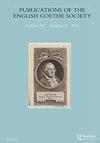"现在,你们都在我人民的怀里放一首歌
IF 0.1
3区 文学
0 LITERATURE, GERMAN, DUTCH, SCANDINAVIAN
引用次数: 0
摘要
本文认为歌德的《西方-östlicher Divan》处于神秘与清晰、排他性与大众化的双重张力中,这种张力塑造了过去两百年来对这一循环的接受。它跟随谎言的痕迹——被同时代人定义为“流行”——通过Divan诗歌及其在19世纪的使用,最后更详细地研究了1900年左右主要的“重新发现者”的非流行策略。本文章由计算机程序翻译,如有差异,请以英文原文为准。
‘Nun so legt euch liebe Lieder / An den Busen meinem Volke’: (De-)Popularisierungsdynamiken des West-östlichen Divans im neunzehnten und frühen zwanzigsten Jahrhundert
ABSTRACT This essay sees Goethe’s West-östlicher Divan in the twofold tension between the cryptic and clarity, exclusivity and popularity that has shaped the reception of the cycle for the last two hundred years. It follows the traces of the lied — defined by contemporaries as ‘popular’ — through the Divan poems and their uses in the nineteenth century and finally examines in more detail the de-popularizing strategies of the major ‘re-discoverers’ of the collection around 1900.
求助全文
通过发布文献求助,成功后即可免费获取论文全文。
去求助
来源期刊

Publications of the English Goethe Society
LITERATURE, GERMAN, DUTCH, SCANDINAVIAN-
CiteScore
0.10
自引率
0.00%
发文量
15
 求助内容:
求助内容: 应助结果提醒方式:
应助结果提醒方式:


